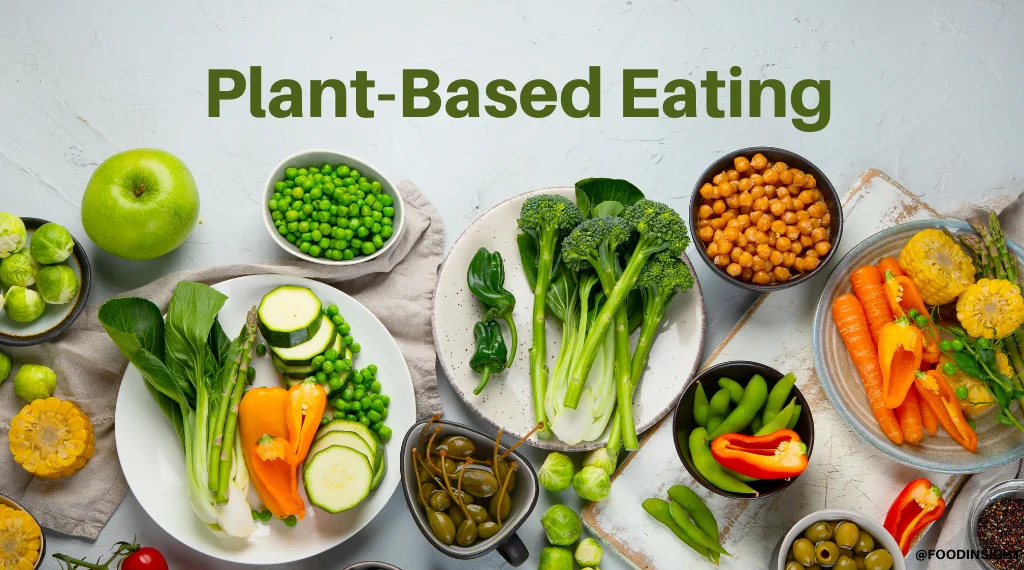The Top 5 BBQ Sauces Every Plant-Based Chef Should Stock
The Top 5 BBQ Sauces Every Plant-Based Chef Should Stock
Blog Article
All Concerning Healthy And Balanced Food: Advantages of Taking On Plant Based Choices
The discussion bordering plant-based diet plans has acquired considerable attention in recent times. Numerous individuals are checking out the prospective health advantages, dietary advantages, and ecological impacts related to these nutritional choices. As individuals become extra aware of their food's impact on health and sustainability, inquiries arise regarding the usefulness of adopting such a way of living. What certain modifications can one anticipate, and just how might these choices reshape not only individual health yet also the world's future?
Recognizing Plant-Based Diet Plans
Several people connect plant-based diets mostly with vegetarianism or veganism, these diet regimens can include a vast variety of eating patterns that focus on entire, minimally processed plant foods. Such diet plans typically consist of fruits, veggies, entire grains, nuts, seeds, and beans, while limiting or eliminating pet products. This adaptability allows people to customize their nutritional selections according to personal preferences and nutritional requirements. Some might embrace a mainly plant-based diet regimen while still occasionally consuming meat or milk, often described as a flexitarian strategy. The emphasis stays on including even more plant foods, which can lead to a varied selection of dishes and tastes. Recognizing these different analyses of plant-based eating is vital for valuing its availability and allure in contemporary food culture.
Health And Wellness Advantages of Plant-Based Foods
The health and wellness benefits of plant-based foods are substantial, offering a nutrient thickness benefit that supports general wellness. Research indicates that these foods can boost heart health and wellness and play a crucial function in reliable weight administration. By integrating extra plant-based options, people might enhance their dietary selections and advertise long-lasting wellness.
Nutrient Density Advantage
Nutrient thickness plays a necessary duty in the health benefits of plant-based foods, making them an engaging selection for those seeking a balanced diet plan. Plant-based foods, such as fruits, vegetables, beans, nuts, and whole grains, are commonly abundant in important vitamins, minerals, and antioxidants while being reduced in calories. This high nutrient thickness enables individuals to consume fewer calories while still fulfilling their dietary demands. In addition, these foods are loaded with nutritional fiber, advertising digestive system wellness and aiding in weight monitoring. By incorporating nutrient-dense plant-based choices, consumers can enhance their total health, sustain their body immune systems, and decrease the risk of persistent diseases. Ultimately, the nutrient density of plant-based foods underscores their significance in a health-conscious lifestyle.
Heart Wellness Improvement

Weight Management Support
Along with advertising heart health, a plant-based diet regimen can substantially help in weight administration. This nutritional technique emphasizes whole foods such as fruits, veggies, vegetables, nuts, and whole grains, which are typically lower in calories and higher in fiber contrasted to animal-based items. The high fiber web content aids boost satiation, lowering total calorie consumption. Plant-based diet plans are usually rich in vital nutrients while reduced in harmful fats, making it simpler to preserve a healthy and balanced weight. Research study shows that individuals that take on a plant-based way of living tend to have lower body mass indexes (BMIs) and experience more effective fat burning compared to those that consume meat-heavy diet plans. Accepting plant-based options is a tactical option for effective weight monitoring.
Nutritional Worth of Plant-Based Ingredients
Plant-based ingredients are rich in vital nutrients, providing a diverse array of vitamins, minerals, and anti-oxidants that contribute to total health. A contrast of healthy protein sources reveals that while animal products are commonly deemed exceptional, lots of plant-based choices supply sufficient protein and other helpful substances. Understanding the nutritional value of these ingredients can assist individuals make informed nutritional options.
Vital Nutrients in Plants
Nutrient-rich active ingredients discovered in plants supply a varied variety of vital minerals and vitamins that add considerably to overall wellness. These active ingredients are rich in vitamins A, C, and K, which sustain immune function, vision, and blood clot, respectively. In addition, plants offer essential minerals such as potassium, magnesium, and calcium, important for heart health and wellness, muscle mass function, and bone toughness. The existence of fiber in plant-based foods help food digestion and advertises a healthy and balanced intestine microbiome. Anti-oxidants, found generously in vegetables and fruits, help combat oxidative stress and reduce swelling. In addition, several plant foods are low in calories yet high in nutrients, making them an outstanding option for those seeking to preserve a healthy and balanced weight while making sure optimal nutrient intake.
Comparing Healthy Protein Resources
Healthy protein sources vary significantly in their nutritional accounts, with plant-based active ingredients using distinct benefits. Unlike animal proteins, which usually include hydrogenated fats and cholesterol, plant healthy proteins often tend to be lower in these harmful elements. Legumes, nuts, seeds, and whole grains are abundant in vital amino acids, fiber, vitamins, and minerals. For example, lentils offer high protein material alongside significant iron and folate, while quinoa is a full healthy protein, supplying all nine essential amino acids. Additionally, plant-based proteins are typically accompanied by anti-oxidants and phytochemicals that support general health. The shift to plant-based protein sources not just enhances nutritional consumption yet additionally aligns with sustainable nutritional methods, reducing environmental effect and advertising long-lasting health benefits.
Ecological Effect of Plant-Based Consuming
As understanding of environment modification grows, several people are exploring sustainable nutritional selections that can greatly decrease their environmental impact. Plant-based eating has actually become a significant contributor to decreasing greenhouse gas discharges, which are largely related to livestock production. The growing of fruits, grains, vegetables, and vegetables commonly calls for less sources, such as water and land, compared to pet farming. Additionally, plant-based diet plans can bring about decreased logging, as less land is required for grazing animals or expanding pet feed. By shifting towards plant-based alternatives, customers can sustain biodiversity and promote much healthier communities. On the whole, welcoming plant-based eating not just benefits personal health yet additionally represents an important action towards ecological sustainability and preservation initiatives.
Conquering Common Misconceptions
While lots of people acknowledge the benefits of a plant-based diet, several misunderstandings commonly hinder them from fully accepting this way of living. An usual belief is that plant-based diet regimens lack adequate protein; however, numerous plant sources, such as vegetables, nuts, and tofu, offer enough healthy protein. In addition, some think that this diet is expensive, when actually, staples like beans, rice, and seasonal vegetables can be fairly budget friendly. Another misunderstanding is that plant-based eating is overly limiting, whereas it actually supplies a varied variety of tastes and foods. Numerous fret that a plant-based diet plan might lead to shortages, yet with proper planning, people can get all needed nutrients, including vitamins and minerals, while taking pleasure in a large selection of delicious meals. Broad Tips for Transitioning to a Plant-Based Lifestyle
Making the change to a plant-based lifestyle can be an enriching experience, though it often calls for some guidance to browse the initial adjustments. Individuals are urged to start progressively, incorporating even more fruits, veggies, legumes, and whole grains right into their meals while decreasing meat and dairy consumption. Meal preparation is vital; preparing a regular food selection can assist ease the change and protect against final harmful choices. Exploring cooking methods and brand-new dishes can also boost the experience and keep excitement regarding plant-based eating. In addition, signing up with support groups or neighborhoods can supply inspiration and share important suggestions. Remaining educated regarding nourishment assurances well balanced dishes, avoiding shortages while cultivating a healthy and balanced, satisfying plant-based way of life.

Delicious Plant-Based Meal Ideas
Exploring scrumptious plant-based dish ideas click here for more info can influence individuals to accept an extra healthy diet regimen. One preferred option is a hearty quinoa salad, including cherry tomatoes, cucumber, and a zesty lemon-tahini clothing. An additional favorite is a tasty lentil stew, packed with carrots, celery, and great smelling natural herbs, ideal for a reassuring supper. For morning meal, overnight oats made with almond milk, chia seeds, and covered with fresh berries give a healthy beginning to the day. In addition, a lively vegetable stir-fry with tofu and a selection of vivid veggies can be a fast yet pleasing meal. Creamy avocado toast on whole-grain bread, sprinkled with spices and seeds, supplies a basic yet delicious treat. These dishes showcase the selection and richness of plant-based consuming.

Frequently Asked Questions
Can a Plant-Based Diet Plan Supply Enough Protein?
The inquiry of whether a plant-based diet regimen can give adequate protein is typical. Numerous sources, including beans, nuts, seeds, and whole grains, can satisfy protein requires effectively, sustaining a healthy and well balanced diet plan for individuals.
Are Plant-Based Diet Regimens Suitable for Children?
The suitability of plant-based diet regimens for kids relies on careful planning. Ample nutrients should be assured, including proteins, vitamins, and minerals. With proper assistance, such diet plans can support healthy development and advancement in youngsters.
Just how Do I Eat in restaurants on a Plant-Based Diet?
Eating out on a plant-based diet involves looking for restaurants with diverse menus, asking for alterations, and discovering vegan-friendly alternatives. Preparation ahead and connecting nutritional choices can enhance the eating experience while keeping dietary options.
What Prevail Irritants in Plant-Based Foods?
Common allergens in plant-based foods consist of soy, gluten, nuts, and seeds - BBQ Sauces. People following a plant-based diet regimen ought to be conscious of article source these allergens and you could try these out review tags carefully to avoid unfavorable reactions and guarantee risk-free intake
Can Plant-Based Diets Assist With Weight-loss?
Research shows that taking on a plant-based diet regimen might promote weight loss as a result of its commonly lower calorie thickness and higher fiber content. This mix can boost satiety, helping individuals handle their caloric consumption effectively. Several individuals associate plant-based diet regimens mainly with vegetarianism or veganism, these diet regimens can incorporate a wide array of eating patterns that prioritize entire, minimally processed plant foods. Nutrient thickness plays an important function in the wellness benefits of plant-based foods, making them an engaging option for those seeking a balanced diet plan. Plant-based diets have been shown to noticeably enhance heart health, as they usually include elements that sustain cardio function. In enhancement to advertising heart wellness, a plant-based diet regimen can considerably assist in weight management. A typical idea is that plant-based diet regimens lack sufficient protein; however, many plant sources, such as beans, nuts, and tofu, provide sufficient healthy protein.
Report this page